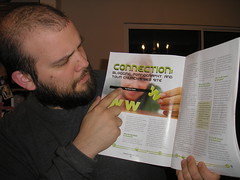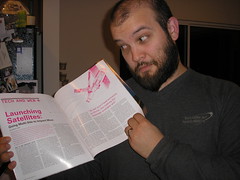If you were to have walked up behind him, quietly, he wouldn’t have noticed you. He was lost in his writing, scribbling down the last words of humankind. His journal was the sides and corners of some operating manual he had found – it was the only paper around. The zigzag of words and idea flowed over, above and around the preprinted text, making these final, sacred words a jumble of memories and inked, mechanical instructions.
“My name is Carlos, and I am the last living human,” he had written not long ago. He read those words to himself again, agonizing over whether they told the depth of his pain and loneliness. It seemed to him like there should be some kind of adjective or modifier that should accompany such a dramatic statement. He wasn’t much of a writer, really. It was a bit of a shame that he should be chosen to write the final words of mankind. His name, Carlos, suddenly seemed silly to him. From Adam to Carlos. Some name beginning with “Z” would have been more catchy.
“I had a beautifully horrific view of the destruction. The Sun set out a solar flare that was immense, like a whip trailing across our little Universe. When the flare made contact with Earth, it was with such precision one might have thought the Sun was jealous of the moon’s eternal dance with our world. The flare cracked upon the Earth, destroying it. I saw it all happen; I watched the destruction of my homeworld happen in a flash, before humanity had a chance to say a prayer.”
He was proud of his words there. He liked that thought… that the Sun was jealous of the moon. It gave him something to believe in. He thought that maybe, just maybe, he wasn’t the only sentient being still alive. Earth was destroyed. His friends, his family, his crew were dead. Maybe, he hoped, there was something else still out there.
Carlos stood up, walking on the soft dust of the moon, towards his lunar base. His team had been the living on the moon for only a month when the disaster happened. They were the first of such teams to be sent to the moon; NASA had finally gotten its act together and planned to develop a way of life on the moon. The plan was to build a small, sustainable city there or no more than 1,000 people. Progress on Earth due to the EPA requiring alternative fuels and sustainable products had finally made it feasible to live off of our home planet. It was made financially possible by the networks; they had broadcast rights to life in space. The science made it feasible… the entertainment value made it profitable.
Carlos stood with one of the camcorders in his hand. He was just supposed to be a stagehand. He knew camcorders inside and out… he wasn’t creative enough to be a director but he had a keen eye for the angles and a soft focus. It was time for another burial.
Carlos took his time setting the camera on its tripod, trying to catch the right light from the sun. He would always have the lunar base in the background to give the burial some sort of perspective. He hated how people thought the first man-on-the-moon was from a soundstage. He hit the record button, and began digging.
“I’m digging this grave for Nathan Ellis. Captain Ellis was good man, the last of the crew to give up. I think he wanted to be the last of us all. He would have made a better last human than me. He would have honored us all with better words and a better dream.
I didn’t mean to kill him. He just wouldn’t stop breathing. We chose to keep our mics always on so we could hear each other in case of emergency. He would breathe so heavily. I tried to turn him down but it got louder and louder in my head. He wouldn’t listen to me and just shut up.
I’m using his oxygen tank now, in honor of his death.”
It had been a week since the Sun’s destruction of the Earth. When the flare struck the Earth it wasn’t what they might show in the movies. There wasn’t some massive explosion, sending rocks every which way. It was more like a boiled egg cracking, then falling into pieces. It might have even been possible that some people might have found a way to live on these large chunks separated planet, but Carlos didn’t allow himself that hope. Slowly, over the week, the chunks were getting further and further apart, each with their own gravity field.
Carlos had stopped looking towards the Earth in several days, so he hadn’t noticed anything unusual. It wasn’t until a human body, disfigured but clearly in civilian clothes (possibly shorts? A tank top?) landed on the ground in front of the camera.
“No,” was all he could mutter.
Carlos saw a piece of the Earth slowly drifting towards the moon, pulled in by its gravity. The smaller chunks of the Earth had been drawn to the moon. He guessed that maybe 100 miles away from his base, an Earth comet was about to crash into the moon. In the comet’s orbit, he saw hundreds – maybe thousands – of human bodies.
Carlos was paralyzed. Human bodies were landing on the moon’s surface all around him. He began digging deeper. They would all need graves, he thought.
A redheaded woman landed near him… or at least that’s what he thought it was. It was hard to tell if she really was even a human, but in Carlos’ mind he saw her. His daughter was a redheaded beauty of seven years old.
He patted Molly on the head. She was a beautiful sprite of a child, her poise full of grace and her hair full of mud. A tomboy, for sure, she took after her father. Carlos had loved Molly like a precious jewel. He understood the world that lived and breathed around him and new that once she was old enough there would be enough pain and anguish for her deal with on her own… he wanted to be sure that her childhood would be filled with all the care and affection he could give.
When Carlos was approached to work on the lunar base project, he did so with two caveats. The first was that he would be allowed to use the video equipment to send personal videos back to his family. The second was that Molly and his wife, Mary, would be in the first group of civilians to make the transition to living on the moon.
Carlos only took the job knowing that he was building a better future for Molly. Being away from his family was going to be torture, but a man can be brave when he knows that he’s been tasked with making history. He ruffled Molly’s hair, bent down, and gave her a loving, almost casual, temporary hug goodbye. He would see her soon, he told her.
Carlos scooped up the decayed, charred bag of flesh that had fallen near him. Had you been there with him, you would have told him that it wasn’t Molly. There weren’t any distinguishing features. From your perspective, you wouldn’t have been sure if the charred thing in his arms was Molly or a pet dog.
Carlos wept.
Openly, unashamedly, he wept as he held his beautiful Molly in his arms. What father is meant to bury his daughter? What father should know that he could have held on a little longer, could have been a little less brave, should have not done the right thing for his race and instead stayed home, riding a bike with his child and making mudpies? What father wouldn’t have chosen a few more weeks with his child instead of being the final survivor of the human race?
As he looked up from the charred remains of Molly, Carlos saw his last glimmer of hope walking towards him. Slowly, as if he was in some slow-motion movie sequence, a woman was walking towards him.
‘Could it be?’ he thought. ‘Someone survived. Someone else is alive. I’m not alone.’
“Thank you, God,” he said aloud, though his mic, where it was picked up by the still listening camcorder.
Carlos could feel his energy returning, his blood filled with hope. He didn’t find it odd that she walking towards him without any protection, no restrictive space suit. He could see her every curve and brilliant beauty. It did not surprise him that she was on fire, her hair made of flames and her skin bristling with heat.
“Hello, Carlos. I’ve come to save you,” she said.
“Save me?”
“I love you, Carlos. I am the Sun, I am all powerful. I take what I want.”
“Why… why me?” was all he could stammer out. He was on his knees now, taken aback by the sheer heat of the Sun. He was weak. He was showing his submission to the Sun.
“There were too many humans, Carlos. I only ever wanted you.”
“But I’m no one special. Why am I the last to live? Why did you spare me?”
“Clearly, you’re a survivor. You must be special if you’re still alive and everyone else is gone. Look around you… nothing remains here for you.” Sharpening her eyes, glaring into weak Carlos’ tortured mind, she said, “Only the Sun remains. Only I have love for you. Don’t you love me?”
The heat had dried his memory. Gone was his concern for the charred remains of some fleshly thing that had fallen near him. Was he ever married? He couldn’t remember her name… surely he was married once. “Love you?” he asked.
“Yes, Carlos – Love me.” It was more a command than an answer to his question. “You’re the last human to live. Surely you know what love is. Surely you want to love and be loved. Isn’t that what humanity is all about?” The Sun smiled a smirk of a smile and turned away.
“Please, don’t let me die alone,” were his last words.
The Sun just walked across the moon’s horizon, into the ball of gas light years away, ever so slightly with a sway of her hips.
Carlos sat there, on his knees, for what must have been hours. He mind was empty, it seemed. He slowly stood up, letting the blood return to his tingling calves and cold feet. He took a few steps backwards, the weight of his steps crumbling the charred remains he so tenderly held only moments (hours?) ago. He didn’t notice.
He climbed into the lunar base, walking past the camcorder and Captain Ellis’ grave site. He walked down the echoing halls, past rations and the few remaining oxygen tanks. He walked past his room and carried off no personal effects. He walked to the ship’s docking station, climbed into the captain’s chair and initiated the take off sequence. Carlos set the ship on autopilot and, in moments, his retinas were burned from the light of the sun.
If you had been there, you might have picked up his clumsy journal of an operating manual. If you had been there, you might have finished Captain Ellis’ burial. If you had been there, you would have watched as Carlos drifted off into space, seeking love one last time.





 Lauching Satellites, my first article for Collide Magazine, is
Lauching Satellites, my first article for Collide Magazine, is 

